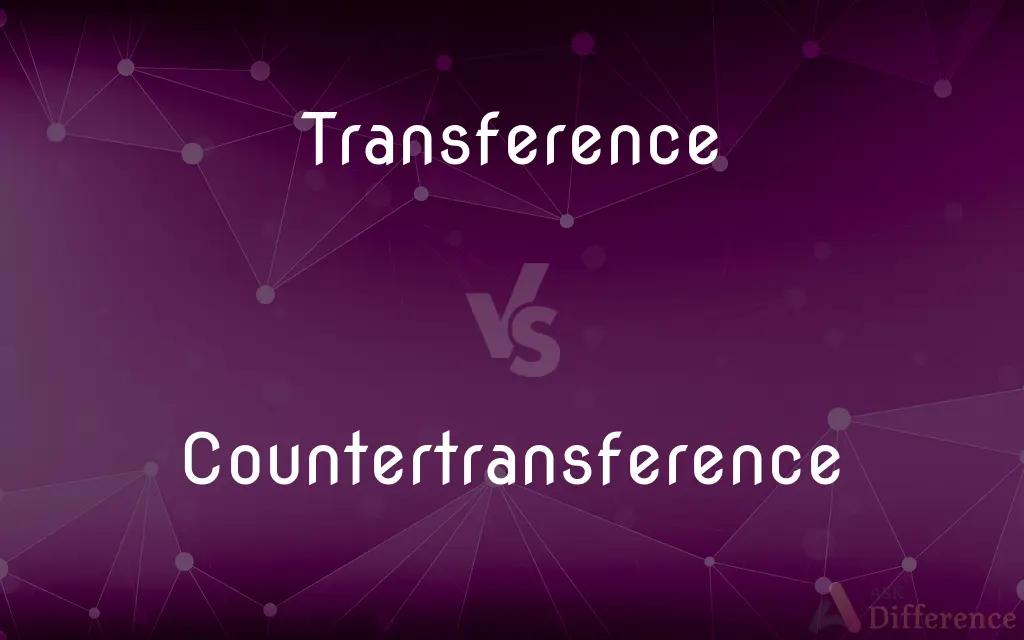Transference vs. Countertransference — What's the Difference?
By Tayyaba Rehman & Fiza Rafique — Updated on April 25, 2024
Transference involves a client projecting feelings about others onto their therapist; countertransference is when therapists project their own unresolved feelings onto clients.

Difference Between Transference and Countertransference
Table of Contents
ADVERTISEMENT
Key Differences
Transference occurs when a client unconsciously redirects feelings and desires from past relationships onto the therapist, treating them as if they were a significant other from their life. Countertransference, on the other hand, happens when a therapist projects their personal feelings and biases onto the client, which can affect the therapeutic relationship.
Transference is often seen as a useful tool in psychotherapy, providing insight into a client's unresolved conflicts and interpersonal patterns. Whereas countertransference, if unrecognized or unmanaged, can potentially hinder the therapeutic process by introducing the therapist's personal issues.
In transference, clients might experience intense emotions such as love, hatred, or dependency towards their therapist based on past experiences. Conversely, countertransference can involve a range of emotions from therapists, such as overidentification with the client, hostility, or even gender attraction.
Transference is typically expected and can be therapeutically harnessed to explore the client’s psyche and improve their emotional understanding. Whereas countertransference requires therapists to engage in self-reflection and possibly supervision to ensure it does not interfere with treatment efficacy.
Through understanding transference, therapists can better comprehend the relational dynamics that the client replicates. In contrast, managing countertransference is crucial for maintaining professionalism and ethical boundaries in therapy.
ADVERTISEMENT
Comparison Chart
Definition
Client projects feelings onto therapist
Therapist projects feelings onto client
Role in Therapy
Insight into client's past relationships
Risk of bias and treatment interference
Emotional Dynamics
Originates from client's unresolved issues
Originates from therapist's unresolved issues
Professional Management Needed
Used as a therapeutic tool
Requires management to maintain professionalism
Potential Outcomes
Can deepen therapeutic insight
Can hinder therapeutic process if unmanaged
Compare with Definitions
Transference
Reliving old conflicts in therapy.
She often argues with her therapist as she did with her ex-partner.
Countertransference
Reaction to client's transference.
He often feels defensive when his clients project anger onto him.
Transference
Use in psychoanalysis.
Psychoanalysts consider transference crucial for accessing unconscious material.
Countertransference
Potential therapy barrier.
His countertransference was interfering with objectively viewing the client's issues.
Transference
Misplaced affection or resentment.
He feels unwarranted resentment towards his therapist, mirroring his past grievances.
Countertransference
Therapist's emotional entanglement with client.
The therapist felt overly responsible for her client's happiness.
Transference
Projection of past feelings to therapist.
A client may see his therapist as a parental figure due to unresolved childhood issues.
Countertransference
Unconscious therapist responses.
She found herself disliking a client, reflecting her own unresolved feelings about her brother.
Transference
Affects therapeutic relationship.
Transference can intensify the emotional connection in therapy.
Countertransference
Requires self-awareness and supervision.
She discusses her feelings in supervision to prevent countertransference impacts.
Transference
Transference (German: Übertragung) is a phenomenon within psychotherapy in which the feelings a person had about their parents, as one example, are unconsciously redirected or transferred to the present situation. It usually concerns feelings from a primary relationship during childhood.
Countertransference
Countertransference is defined as redirection of a psychotherapist's feelings toward a client – or, more generally, as a therapist's emotional entanglement with a client.
Transference
The act or process of transferring.
Countertransference
The emotional reaction of the analyst to the subject's contribution.
Transference
The fact of being transferred.
Countertransference
Psychological transference by a psychotherapist in reaction to the emotions, experiences, or problems of a patient undergoing treatment.
Transference
The process by which emotions and desires originally associated with one person, such as a parent or sibling, are unconsciously shifted to another person, especially to a psychotherapist or psychoanalyst during a course of treatment.
Countertransference
(psychotherapy) The transference of a therapist's own unconscious feelings to his or her patient; unconscious or instinctive emotion felt towards the patient.
Transference
The act of conveying from one place to another; the act of transferring or the fact of being transferred.
Countertransference
The psychoanalyst's displacement of emotion onto the patient or more generally the psychoanalyst's emotional involvement in the therapeutic interaction
Transference
(psychology) The process by which emotions and desires, originally associated with one person, such as a parent, are unconsciously shifted to another.
Transference
The act of transferring; conveyance; passage; transfer.
Transference
(psychoanalysis) the process whereby emotions are passed on or displaced from one person to another; during psychoanalysis the displacement of feelings toward others (usually the parents) is onto the analyst
Transference
Transferring ownership
Transference
The act of transfering something from one form to another;
The transfer of the music from record to tape suppressed much of the background noise
Common Curiosities
Why is understanding transference important in therapy?
It provides crucial insights into a client's past relationships and emotional patterns.
Can transference be beneficial in therapy?
Yes, it can be used by therapists to gain deeper insight into client's psychological issues.
What is transference?
Transference is when clients project their past relational dynamics and feelings onto their therapist.
How does countertransference differ from transference?
While transference involves client projections, countertransference involves therapist's projections onto the client.
What risks does countertransference pose in therapy?
It can lead to bias and ethical breaches if not properly managed.
How can therapists manage countertransference?
Through self-reflection, ongoing personal therapy, and professional supervision.
What are signs of transference in a client?
Signs include strong emotional reactions to the therapist that seem disproportionate to the current interaction.
Is countertransference always harmful?
Not necessarily, if recognized and managed, it can enhance therapist empathy and understanding.
How should a therapist react to countertransference?
By acknowledging it, seeking supervision, and employing strategies to minimize its impact.
What training do therapists receive to handle transference?
Therapists are trained in recognizing and using transference as a therapeutic tool.
Share Your Discovery

Previous Comparison
Scrutinize vs. Scrutinise
Next Comparison
Sponsee vs. SponsorAuthor Spotlight
Written by
Tayyaba RehmanTayyaba Rehman is a distinguished writer, currently serving as a primary contributor to askdifference.com. As a researcher in semantics and etymology, Tayyaba's passion for the complexity of languages and their distinctions has found a perfect home on the platform. Tayyaba delves into the intricacies of language, distinguishing between commonly confused words and phrases, thereby providing clarity for readers worldwide.
Co-written by
Fiza RafiqueFiza Rafique is a skilled content writer at AskDifference.com, where she meticulously refines and enhances written pieces. Drawing from her vast editorial expertise, Fiza ensures clarity, accuracy, and precision in every article. Passionate about language, she continually seeks to elevate the quality of content for readers worldwide.
















































